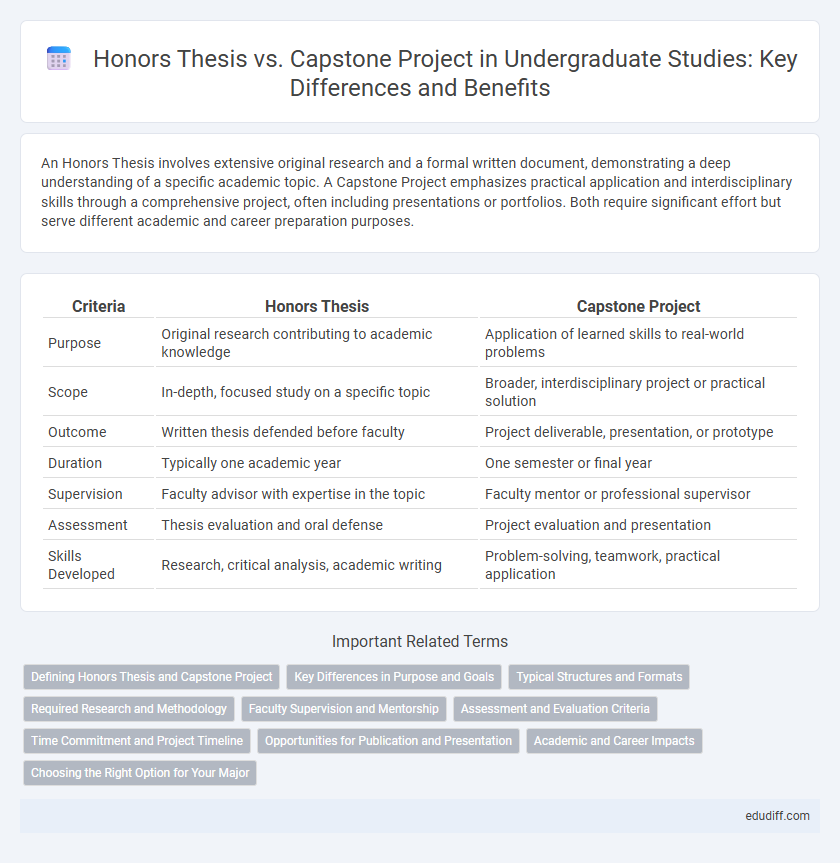An Honors Thesis involves extensive original research and a formal written document, demonstrating a deep understanding of a specific academic topic. A Capstone Project emphasizes practical application and interdisciplinary skills through a comprehensive project, often including presentations or portfolios. Both require significant effort but serve different academic and career preparation purposes.
Table of Comparison
| Criteria | Honors Thesis | Capstone Project |
|---|---|---|
| Purpose | Original research contributing to academic knowledge | Application of learned skills to real-world problems |
| Scope | In-depth, focused study on a specific topic | Broader, interdisciplinary project or practical solution |
| Outcome | Written thesis defended before faculty | Project deliverable, presentation, or prototype |
| Duration | Typically one academic year | One semester or final year |
| Supervision | Faculty advisor with expertise in the topic | Faculty mentor or professional supervisor |
| Assessment | Thesis evaluation and oral defense | Project evaluation and presentation |
| Skills Developed | Research, critical analysis, academic writing | Problem-solving, teamwork, practical application |
Defining Honors Thesis and Capstone Project
An Honors Thesis is a comprehensive research paper completed by undergraduates to demonstrate deep expertise in their field, often involving original research or theoretical analysis. In contrast, a Capstone Project is a practical, hands-on assignment designed to apply accumulated knowledge to real-world problems or professional scenarios. Both serve as culminating academic experiences but differ in focus, with the Honors Thesis emphasizing scholarly inquiry and the Capstone Project emphasizing applied learning and problem-solving skills.
Key Differences in Purpose and Goals
An Honors Thesis emphasizes original research to contribute new knowledge within a specific academic discipline, demonstrating deep scholarly inquiry and critical thinking. A Capstone Project focuses on applying interdisciplinary skills to solve practical problems, showcasing the integration of theory and practice relevant to professional fields. The thesis aims to prepare students for graduate-level research, while the capstone enhances career readiness through real-world experience.
Typical Structures and Formats
Honors theses typically follow a formal research structure including an abstract, literature review, methodology, results, and discussion, emphasizing originality and depth of analysis. Capstone projects often adopt a practical format with problem statement, project design or implementation, and reflective evaluation, prioritizing applied skills and real-world solutions. Both formats require a final presentation or defense, but the honors thesis leans toward academic rigor, while the capstone emphasizes experiential learning outcomes.
Required Research and Methodology
An Honors Thesis demands extensive original research, requiring students to formulate a hypothesis, conduct in-depth analysis, and utilize advanced research methodologies typically found in academic journals. In contrast, a Capstone Project emphasizes practical application, often involving case studies, problem-solving, and synthesis of existing knowledge with less emphasis on original research. The methodology for an Honors Thesis follows rigorous scholarly protocols, while the Capstone Project prioritizes interdisciplinary approaches and real-world problem-solving techniques.
Faculty Supervision and Mentorship
Faculty supervision and mentorship in Honors Theses often involve close, one-on-one guidance to develop original research and critical analysis skills, fostering deep academic inquiry. Capstone Projects typically emphasize collaborative faculty support to integrate practical knowledge and interdisciplinary applications, preparing students for real-world challenges. Both approaches enhance student learning through tailored mentorship but differ in scope and intensity of faculty involvement.
Assessment and Evaluation Criteria
Honors Thesis assessment prioritizes original research quality, critical analysis, and contribution to academic knowledge, often evaluated through a comprehensive written document and oral defense. Capstone Project evaluation emphasizes practical application, problem-solving skills, teamwork, and project deliverables, assessed via presentations, reports, and real-world impact. Both require meeting specific departmental rubrics, but the thesis focuses on scholarly rigor while the capstone highlights experiential learning outcomes.
Time Commitment and Project Timeline
An Honors Thesis typically demands a longer time commitment, often spanning an entire academic year, requiring in-depth research and frequent consultations with faculty advisors. In contrast, a Capstone Project is generally completed within a single semester, emphasizing practical application and synthesis of knowledge from coursework. The extended timeline of an Honors Thesis allows for comprehensive exploration, while the Capstone Project's condensed schedule prioritizes timely execution and presentation.
Opportunities for Publication and Presentation
Honors theses often provide greater opportunities for publication in academic journals due to their emphasis on original research and in-depth analysis, making them attractive to scholarly audiences. Capstone projects prioritize practical application and interdisciplinary collaboration, which frequently results in presentations at industry conferences, showcases, or university symposiums. Both formats offer valuable platforms for students to disseminate their work, but honors theses align more closely with traditional academic publishing.
Academic and Career Impacts
An Honors Thesis provides rigorous research experience, enhancing critical thinking and writing skills highly valued in graduate school admissions and academic careers. Capstone Projects emphasize practical problem-solving and teamwork, equipping students with real-world skills attractive to employers in professional fields. Both experiences boost resumes by demonstrating commitment and expertise, but the Honors Thesis leans toward academia while Capstone Projects align more with industry readiness.
Choosing the Right Option for Your Major
Choosing between an Honors Thesis and a Capstone Project depends on your major's requirements and career goals. An Honors Thesis offers in-depth research experience, ideal for students pursuing graduate studies or research-intensive fields, while a Capstone Project emphasizes practical application and problem-solving relevant to professional careers. Evaluate your academic strengths, interest in independent research, and desired skill set to select the option that best aligns with your undergraduate major and future aspirations.
Honors Thesis vs Capstone Project Infographic

 edudiff.com
edudiff.com